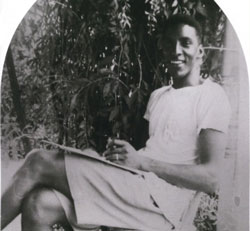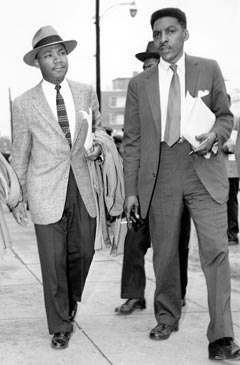
A master strategist and tireless activist, Bayard Rustin is best remembered as the organizer of the 1963 March on Washington, one of the largest nonviolent protests ever held in the United States. He brought Gandhi’s protest techniques to the American civil rights movement, and helped mold Martin Luther King, Jr. into an international symbol of peace and nonviolence.
 Despite these achievements, Rustin was silenced, threatened,
arrested, beaten, imprisoned and fired from important leadership
positions, largely because he was an openly gay man since the 1940's, through a fiercely
homophobic era. Today,
the United States is still struggling with many of the issues Bayard
Rustin sought to change during his long, illustrious career; peace, racial equality, economic
justice and human rights.
Despite these achievements, Rustin was silenced, threatened,
arrested, beaten, imprisoned and fired from important leadership
positions, largely because he was an openly gay man since the 1940's, through a fiercely
homophobic era. Today,
the United States is still struggling with many of the issues Bayard
Rustin sought to change during his long, illustrious career; peace, racial equality, economic
justice and human rights. His focus on civil and economic rights and his belief in peace, human rights and the dignity of all people remain as relevant today as they were in the 1950s and 60s.
Rustin’s biography is particularly important for lesbian and gay Americans, highlighting the major contributions of a gay man to ending official segregation in America. Rustin stands at the intersection of the great struggles for civil, legal and human rights by African-Americans and lesbians and gays. In a nation still torn by racial hatred and violence, bigotry against homosexuals, and extraordinary divides between rich and poor, his eloquent voice is needed today more than ever.
 Bayard Rustin with Martin Luther King, Jr. in 1956 (Credit: Associated Press) |
